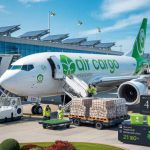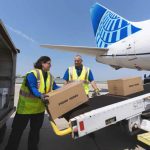The delicate and complex business of transporting high-value goods by air
Transporting high-value goods, whether they are priceless art pieces or antiques, ultra-luxurious goods, critical equipment or temperature-sensitive shipments, involves a complex operation that demand utmost care, safety and security.
When high-value cargo takes to the skies, it brings along a unique set of challenges. Just as with hazardous materials on the road, moving valuable cargo by air involves a distinct set of considerations.
In this article, we will explore the world of high-value cargo transportation by air, where precision and security are paramount. They come with a specific set of challenges that must be met. But safety, security, and efficiency is non-negotiable. Here, we delve into the key considerations that ensure the secure transportation of these invaluable items:
Transporting high-value cargo by air requires a meticulous approach, like the careful handling of delicate museum artifacts. Risks can include theft, damage, or loss during transit. Conducting a thorough risk assessment is fundamental in identifying potential risks and developing strategies to mitigate them. Utilizing risk assessment models can be beneficial in this process.
Selecting the most suitable routes is essential to ensure both safety and timely delivery of high-value cargo. This involves not only choosing efficient air routes but also considering factors such as air traffic, airport congestion, and potential delays. The route selection process is crucial, and often, direct flights or cargo-specific routes are preferred to minimize handling and potential risks.
High-value goods demand heightened security measures. Robust packaging, advanced tracking systems, and secure handling procedures are essential to safeguard the cargo throughout its journey. Compliance with aviation security regulations is non-negotiable. Ensuring that valuable cargo is always under the highest level of surveillance is a key aspect of this process.
Security oversight from origin to destination is non-negotiable. High-value cargo must be under direct supervision, surveillance, or securely stored throughout its journey. The shortest possible tender time is provided, and the cargo is exclusively moved on direct flights. Firearms, dangerous goods, and live animals are not permitted as valuable cargo.
It is imperative that we seek the advice of professionals who are well-versed in high-value cargo transportation before diving into extensive conversations about this specialist subject.
Air Cargo Update was fortunate to have three esteemed individuals share their knowledge on high-value cargo transport: Kirsten de Bruijn, Executive Vice-President of Cargo at WestJet; Joost van Doesburg, Head of Cargo at Schiphol Airport; and Jonas van Stekelenburg, Chief Executive Officer of Maastricht Aachen Airport (MST). The insightful ideas that follow are firmly grounded in their expertise.
Maastricht Aachen Airport’s Commitment
Speaking of the importance of robust security measures, Jonas van Stekelenburg, Chief Executive Officer of Maastricht Aachen Airport (MST), highlights the critical role that airports play in high-value cargo transport. “Pharmaceuticals and valuable electronics make up a substantial portion of the high-value cargo we handle at MST,” he explains.
Factors such as cargo handling expertise, facilities, infrastructure, customs, and regulatory compliance, along with the airport’s strategic location, all play a key role in deciding the route for high-value goods. MST is IATA CEIV-Pharma certified and equipped with cooling facilities designed to handle pharmaceutical cargo within specified temperature ranges.
“We are the second-largest cargo hub in the Netherlands, and we’re surrounded by high-tech distribution centers in a region that has become one of Europe’s main technical hubs,” Stekelenburg notes. MST also offers security services for valuables and has a dedicated and experienced cargo team renowned for operational excellence, collaboration, and a customer-oriented approach.
“We take security very seriously,” Stekelenburg adds. “Our dedicated security department monitors current threats, carries out risk assessments, and ensures our security procedures are up-to-date. Our most important asset in this area is our workforce, which is well-trained and briefed on security awareness and procedures.”
Schiphol Airport’s Enhanced Security
At Schiphol Airport, one of Europe’s key aviation hubs, they have implemented stringent security measures to protect high-value cargo. Joost van Doesburg, Head of Cargo at Schiphol Airport, highlights the latest addition to their security arsenal: the “Secure Import chain information system.”
“This system ensures that only authorized drivers can collect cargo,” says Doesburg. “We can now even better protect goods transported via Schiphol against theft and undermining.”
He emphasizes that this system further protects high-value cargo and ensures Schiphol remains an attractive main port for shippers and forwarders.
WestJet Cargo’s Commitment to Security and Integrity
Speaking on the vital role of security and integrity, Kirsten de Bruijn, Executive Vice-President of Cargo, underscores that high-value cargo transportation requires precision and care. “Safety, security, and efficiency are paramount,” she notes.
“First and foremost, we place a strong emphasis on advanced security arrangements. This begins with security oversight from the cargo’s origin all the way to its destination,” notes De Bruijn. “For high-value cargo, it’s non-negotiable – it must be under direct supervision, surveillance, or securely stored throughout its entire journey.”
“We provide the shortest possible tender time, and we exclusively select direct flights for high-value cargo to ensure swift and secure transit. Items such as firearms, dangerous goods, and live animals are not permitted as part of high-value cargo,” she adds.
De Bruijn underscores WestJet Cargo’s single-minded focus on meticulous security measures. The company deploys appointed security agents to oversee every aspect of the cargo’s journey. “We meticulously monitor cargo hand-offs, ensuring secure storage, and conducting thorough surveillance. Everything is meticulously witnessed and documented, including rigorous cross-checking of security seal numbers,” she points out.
“When it comes to the transportation of high-value cargo, we take no chances. These valuable items are always treated with the utmost care and attention. We transport them separately and securely, with our dedicated security agents accompanying the cargo from the warehouse to the aircraft. This level of dedication ensures the highest level of security for high-value goods,” states De Bruijn.
WestJet Cargo relies on a combination of technology and systems to safeguard high-value cargo. “We partner with security experts and maintain secure areas equipped with advanced surveillance systems,” says De Bruijn. “Throughout storage, we closely monitor documentation and security seals to guarantee the cargo’s integrity. The cargo is transported separately, and our vigilant security agents remain present until the aircraft departs. This comprehensive approach offers top-level protection for valuable shipments.”
The handling of high-value cargo with specific requirements, such as temperature-sensitive or fragile items, is another area where WestJet Cargo excels. They provide designated areas with limited access for the secure storage of such cargo, ensuring it remains protected from tampering or damage. “Precise handling and supervision are fundamental to maintaining the security and integrity of these valuable shipments, ensuring they arrive in perfect condition,” De Bruijn explains.
Balancing efficiency in cargo operations with the specialized handling required for high-value goods is a core focus for WestJet Cargo. “For high-value cargo, we transport it separately and load it last in a dedicated cargo hold. Our security agents accompany it to guarantee its safety,” De Bruijn notes. “This tailored approach ensures the efficiency of cargo operations while safeguarding high-value goods.”
Lastly, Kirsten de Bruijn highlights WestJet Cargo’s dedication to clients with unique or unconventional high-value cargo needs. “We are committed to providing customized solutions that precisely align with these unique requirements,” she says. “Our services encompass advanced security arrangements, secure storage, and direct supervision throughout the journey, ensuring the utmost safety and integrity for unconventional high-value cargo.”
The transportation of high-value goods is a precision game. It’s a world where security isn’t an option; it’s a way of life. As industries continue to produce groundbreaking and invaluable items, the need for reliable, secure, and precise transportation remains as vital as ever. The journey is a combination of security, precision, and a commitment to safeguarding the future.














